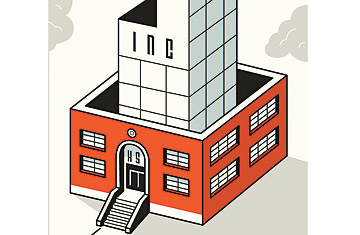
National competitiveness is the topic of the moment, but so much of the debate about it is conducted at 35,000 feet, the policy level. In late March I visited a place in Crown Heights, Brooklyn, where change is happening on the ground. Down the street from public-housing blocks is a new open-admission public school called P-Tech, or Pathways in Technology Early College High School. Launched last September, it's a partnership of the New York City department of education, the New York City College of Technology, the City University of New York and IBM, whose head of corporate social responsibility, Stanley Litow, used to be the city's deputy schools chancellor. The goal is to create a science- and tech-heavy curriculum that prepares kids--some of whom would be the first in their families to graduate from high school, let alone college--for entry- and midlevel jobs at top tech-oriented companies. Each student gets an IBM mentor from Day One. There's a small but serious core curriculum focused on the basics: English, math, science and technology.
There's also a class called Workplace Learning where students pick up the more subtle but crucial skills that will help them navigate a corporate setting: how to debate, how to persuade, how to work in teams, how to exude the confidence and attitude that kids whose parents work for Fortune 500 companies get as a birthright. (P-Tech grads will be first in line for IBM jobs.) The idea is to create a replicable model that can succeed anywhere with any type of kid. "Everyone who comes here to work with me has to believe that every single student here can make it," says the charismatic principal, Rashid Davis, a Columbia teachers'-college grad who grew up shuttling between the poorest counties in New York and South Carolina and credits education with saving his life.
The most important thing is that P-Tech students will graduate with not only a high school diploma but an associate's degree too. That's crucial, since 63% of American jobs will require postsecondary training by 2018. The U.S. economy will create more than 14 million new jobs over the next 10 years but only for people with at least a community-college degree. Those jobs--positions like dental hygienist, medical-laboratory technician, electrician, aircraft mechanic and entry-level software engineer--will allow millions entry to the middle class. Many of them will require serious technology skills.
The problem is that a startlingly low percentage of U.S. college students--30% at four-year colleges and only about 25% at two-year colleges--finish their degrees. Some of that underachievement is money-related, but some of it is due to the fact that the U.S., unlike high-growth countries like Germany, doesn't do much to connect educators with corporations doing the hiring. That's evident in the double-digit unemployment rates among new college grads. Many have no marketable skills, just large debts and a degree in, say, sports marketing and communication or some other faux major.
